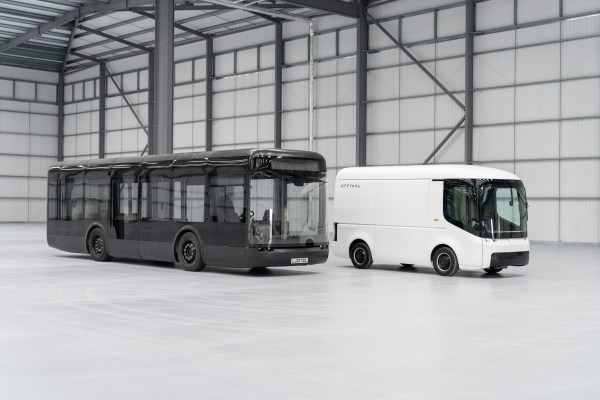
Executives from London-based commercial EV company Arrival told investors Thursday the company was on track to meet planned product launch dates, but much will depend on whether or not the company can fulfill orders and turn letters of intent into sales — especially a crucial van order with UPS, which could bring in upwards of $1 billion in revenue.
The company’s non-binding orders and letters of intent total 59,000 vehicles — a number that includes an agreement with UPS to purchase up to 10,000 vehicles across the U.S. and Europe, and an option in the agreement for an additional 10,000 vehicles. If the logistics giant opts to purchase all 20,000 vehicles, the deal could be worth over $1 billion, the company told investors last year.
The 59,000 figure also includes two sales that have come in since the close of last quarter: an agreement with car leasing company LeasePlan for 3,000 vehicles, which is expected to be completed in the third quarter, and a five-bus order from Anaheim, California’s public transportation network.
The company’s earnings report contains an important asterisk toward the end: “All references to orders and LOIs are non-binding and subject to cancellation or modification at any time.” And there are a number of steps the company must complete before we start to see its vans and buses on the road, including public road trials, completed prototype builds and production certification.
Despite the to-do list, Arrival executives said the Arrival Bus will commence trial productions in the U.K. at the end of this year, with a planned start of production at the company’s South Carolina microfactory by the second quarter of 2022. The first Arrival Vans will be built in the U.K. by the third quarter of next year.
Arrival President Avinash Rugoobur also said the company has decided to open a product development R&D center in India, where it has seen an increase in “potential” orders.
“I think the Indian market is extremely important,” Arrival CEO Denis Sverdlov added. “It’s very market unique in terms of size. Pricing for the product and the certification for the product is very much different than what we’re used to seeing in Europe or the United States. For us it’s an extremely important step because this enables us to create vehicles which can be successful in countries like in Asia and India and so on, so for us it’s a big, big step.”
A different manufacturing approach
Arrival, whose investors include Hyundai Motor Company and Kia Motors Corporation, wants to take what it pitches as a new approach to auto manufacturing. Instead of building a large, centralized factory, it aims to build commercial EVs in scalable, more capex-light regional microfactories – and it wants to open 31 by 2024. Arrival’s factories use autonomous mobile robots, or AMRs, which the company develops in-house. The robots were designed to operate autonomously and run on a single AMR software.
The company already has plans for two microfactories in the U.S.: one in West Charlotte, North Carolina, and a factory in Rock Hill, South Carolina. The company also has a microfactory in Bicester, U.K., which the company said has already produced over 500 composite panels.
Construction on the North Carolina site is due to be complete in October this year, with production commencing in the fourth quarter of next year. The EVs built at that location will eventually end up in UPS’s North American fleet.
Like other new EV makers, the company still has no revenue yet to speak of and its earnings report reflects the expenses associated with bringing a new vehicle to market. Arrival reported an EBITDA loss of €29 million ($34 million). Its adjusted EBITDA loss was €35 million ($41 million) which widened from the first quarter’s loss of €27 million ($31 million).
Capex came to €65 million ($76 million), primarily due to the costs of staff working on product development and other costs related to factory equipment. The company anticipates spending between €175 million to €225 million ($205 million to $264 million) on capex in the remainder of the year, versus €106 million ($124 million) for the first half of the year. The increase is due to expenses from the Bicester, U.K. microfactory being brought forward into this year, as well as planned openings of other factories in South Carolina and one-off tooling costs.
The company is completing the quarter with €445 million ($522 million) in cash.
Since the first quarter, Arrival has announced a number of partnerships, including with Microsoft for an open software platform, Hitatchi and STMicroelectronics. It also counts LG Chem as its battery cell supplier.
The company, founded in 2015, joined a suite of other transportation startups when it merged with a blank-check firm in March. That transaction, with CIIG Merger Corp., had an implied enterprise value of $5.4 billion and injected the company with around $660 million in cash. The company’s also growing fast: It now has over 2,200 full-time employees, versus 1,300 in December 2020.
Its shares soared to $37.18 apiece in December. Today, the share price opened at $12.80. The company trades on the Nasdaq under the ticker symbol “ARVL.”
"bus" - Google News
August 12, 2021 at 09:59PM
https://ift.tt/3CAuv78
Arrival is on track to begin production of its electric bus and van next year - TechCrunch
"bus" - Google News
https://ift.tt/2rp2JL3
https://ift.tt/3aT1Mvb
Bagikan Berita Ini














0 Response to "Arrival is on track to begin production of its electric bus and van next year - TechCrunch"
Post a Comment